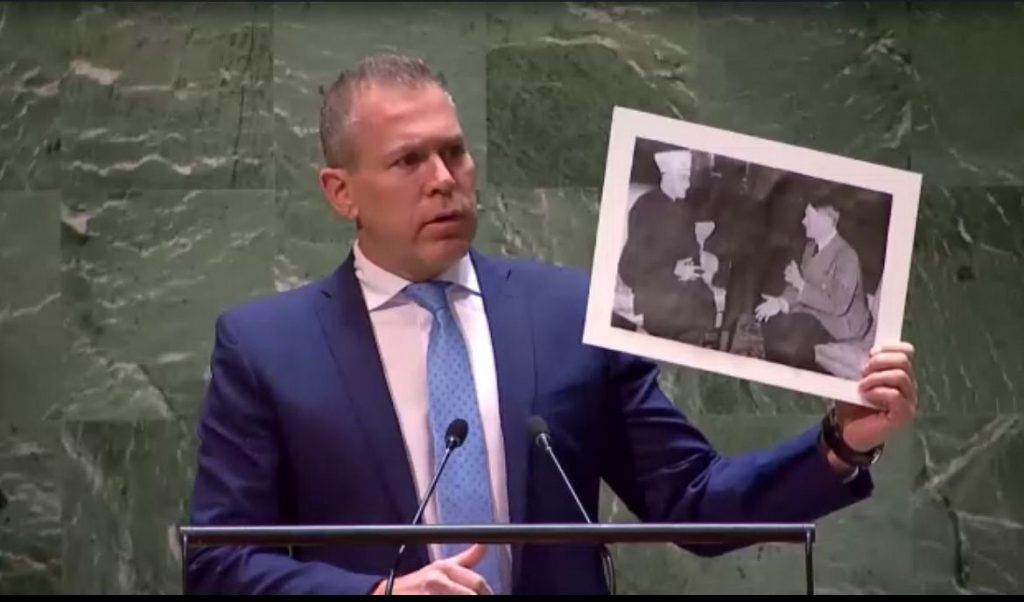Israel’s Ambassador to the United Nations, Erdan, strongly opposed the idea of Palestinian statehood during a U.N. Security council meeting, suggesting that the U.N. was deviating from its original mission of preventing the spread of Nazi ideology by supporting Palestinian statehood. He highlighted the historical ties between Palestinian nationalism and Nazi Germany, pointing to the Grand Mufti of Jerusalem’s collaboration with Adolf Hitler during World War II. Erdan emphasized that the Palestinians’ goal of destroying Israel and killing Jews has remained consistent for decades, making it a conflict focused on annihilation rather than political disputes over land.
The U.N. Security Council convened to discuss the Palestinian Authority’s bid for full U.N. membership, a move opposed by Israel’s right-wing government and hardliners who reject the establishment of a Palestinian state. The Palestinians, frustrated by years of failed peace talks, sought U.N. recognition as an independent state to advance their aspirations for sovereignty. The Security Council was set to make a formal decision on the Palestinian membership application, requiring the Palestinian Authority to control all Palestinian territories and engage in negotiations with Israel before achieving statehood. The ongoing conflict between Israel and Hamas has intensified the focus on the Palestinian-Israeli conflict, underscoring the urgency of finding a resolution to the long-standing dispute.
Erdan’s portrayal of the Palestinians as seeking the destruction of Israel and the murder of Jews resonated with Israel’s concerns about Palestinian statehood, which would potentially legitimize a territory committed to terror and Israel’s annihilation. The historical context of Palestinian nationalism’s ties to Nazi ideology emphasized the deep-rooted animosity towards Israel that predates the U.N.’s involvement in the region. The Security Council’s deliberations over the Palestinian Authority’s U.N. membership application reflected the complex dynamics of the Israeli-Palestinian conflict, with the need for comprehensive negotiations and territorial control cited as prerequisites for statehood.
The Palestinian Authority’s return to the U.N. seeking full membership as a state underscored the stagnation in the peace process and the failure of previous attempts to reach a resolution through bilateral negotiations. The involvement of Hamas in governing Gaza further complicated the Palestinian Authority’s quest for statehood, with the need to establish control over all Palestinian territories highlighted as a key requirement for U.N. admission. The ongoing war between Israel and Hamas added urgency to the issue, prompting renewed focus on the unresolved Palestinian-Israeli conflict and the need for a comprehensive, negotiated solution.
Erdan’s comparison of a potential Palestinian state to a “Palesti-Nazi state” drew attention to the implications of recognizing a territory with a history of terrorism and hostility towards Israel. His condemnation of the U.N. for allegedly supporting extremists by considering Palestinian statehood as a way to counter Nazi ideology added a provocative dimension to the debate over the Palestinian Authority’s bid for U.N. membership. The Security Council’s decision-making process on the membership application highlighted the divergent perspectives on the Israeli-Palestinian conflict and the challenges of reconciling competing interests and narratives.
Overall, the U.N. Security Council meeting on Palestinian statehood revealed the deep-seated divisions and historical grievances that underlie the Israeli-Palestinian conflict. Erdan’s remarks underscored Israel’s concerns about the implications of Palestinian statehood, while the Palestinian Authority’s quest for U.N. membership reflected the frustration with the lack of progress in peace talks. The need for comprehensive negotiations, territorial control, and recognition of historical animosities were central themes in the debate, highlighting the complexities of seeking a resolution to one of the most enduring conflicts in the Middle East.


